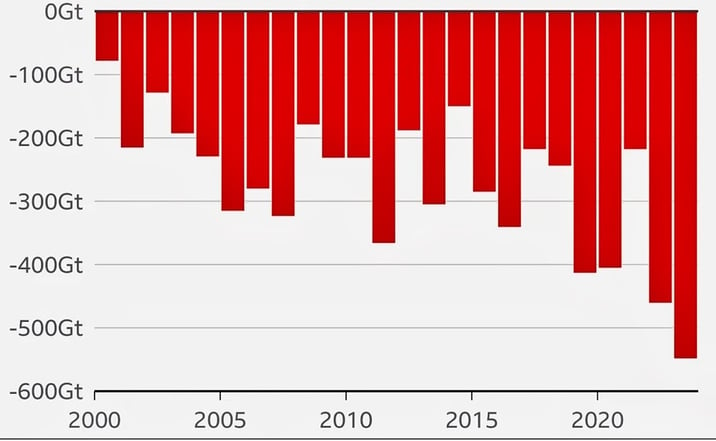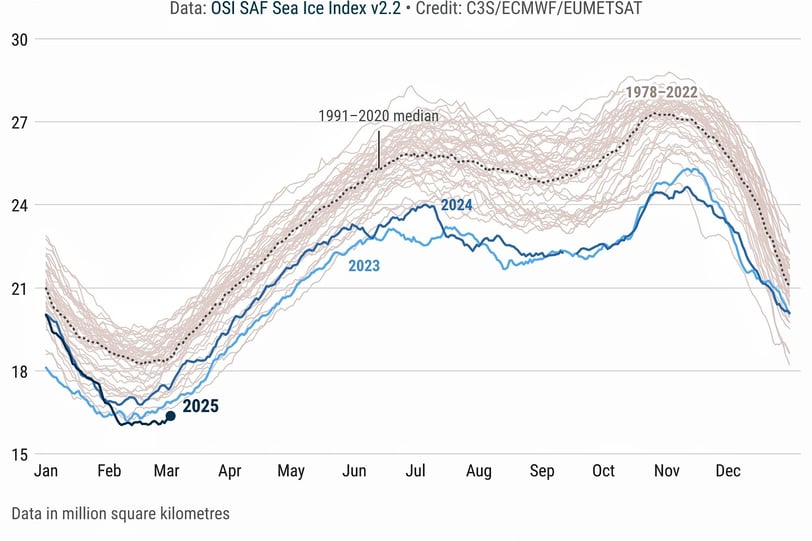

LATEST CLIMATE NEWS
February 2025
Adam Sébire / Climate Visuals
Causes:
It has been widely reported on February 10th that 182 countries have missed a UN deadline to submit new climate pledges for 2035, Carbon Brief analysis shows. In fact, only 13 countries have published their new emissions-cutting plans, known as “nationally determined contributions” (NDCs), by today's deadline.
The 182 countries missing the deadline represent 83% of global emissions and nearly 80% of the world’s economy according to Carbon Brief.
Back in 2015 when almost every country signed the Paris Accord, it was agreed that every country would, every five years, assess their progress in moving towards net zero by 2050. Based on their performance, they would reassess their climate policies, ratcheting up their efforts to cut emissions to ensure that they were on track for net zero.
Of the 13 countries who have returned their NDCs, those from Brazil, the UAE, the US and Switzerland are “not compatible” with a pathway for limiting global warming to 1.5C.
Causes:
Despite Trump's partnership with Elon Musk, CEO of one of the world's largest manufacturers of electric vehicles, the Trump administration has directed a federal agency to disconnect its electric vehicle charging stations, part of the president’s agenda to roll back progress on EVs and clean energy. Yes, you read that correctly.
Impacts:
The 2023 Climate Summit ended with great fanfares as the countries agreed to "transition away from fossil fuels." Now it appears the global commitment is losing momentum. The 'coal to renewables' is slowing. Instead, the consumption of fossil fuels is rising.
Donald Trump's 'national energy emergency' embraces fossil fuels and rejects the development of renewable energy. While that in itself is a nail in the global effort to reach net zero by 2050, it appears that other high-emission countries are being influenced by Trump's policies.
Indonesia has indicated that it may follow in Trump's footsteps. Indonesia has remained in the list of top 10 carbon-emitting countries for years now. Indonesia's special envoy for climate change and energy points out that the US per capita carbon emissions are far higher than Indonesia's so why should Indonesia start shutting down its coal-fired power stations when the US is ramping up fossil fuel extraction?
South Africa's move away from fossil fuels appears to have slowed with the decommissioning of old coal-fired power stations "further delayed".
Argentina, who withdrew their negotiators from COP29, have indicated they will withdraw from the Paris Agreement and increase the production of oil and gas.
India, South Korea and Japan have all indicated that they wish to import more oil and/or gas from the US.
Impacts:
Following 2024's global average temperature which exceeded +1.5°C above pre-industrial levels, many climate scientists pointed out that this did not mean the Paris Accord threshold of +1.5°C had been breached. For this to happen, there must be a 20-year period when global temperatures exceed +1.5°C.The
Studies published in Nature Climate Change claim that the world has entered this period and it is likely that subsequent years will exceed +1.5°C.
The United Nations have already estimated that current emissions reduction pledges put the planet on track for a temperature increase of 2.6-3.1C over the course of this century.


Glambie is a European Space Agency project that has been working on the loss of glacier mass around the world. Their most recent paper, published in Nature this month, concludes that glaciers are melting at an accelerated rate, faster than ever before, and the IPCC's predictions for glacier melt by 2040 have already been exceeded.
Figure 1
Annual change in glacier mass in gigatonnes
Causes:
BP announced it will cut its renewable energy investments by $5bn and instead focus on increasing oil and gas production with a 20% increase in their investment, a sum of no less than $10bn a year.
The reason behind this is pressure from shareholders who want a better return on their investments. BP's shares have been performing worse than Shell and Exxon.
To boost share performance, BP intends increasing its oil production to between 2.3 million and 2.5 million barrels per day by 2030, with hopes of "major" oil and gas projects starting by the end of 2027.
The fossil fuel industry is exploiting the increased prices for oil and gas following the lows of the pandemic. This, together with Mr Trump's decision to increase US oil and gas exploration and drilling, means consumption (burning) of fossil fuels is predicted to rise substantially throughout the next ten years, dashing all hope of the world reaching net zero by 2050.
Impacts:
The monthly climate report from Copernicus/ECMWF indicates that the global sea ice extent reached a new all-time minimum for February according to the latest monthly update of the Copernicus Climate Change Service (C3S).
Arctic sea ice saw its lowest monthly extent for February at 8% below average.
Antarctic sea ice was 26% below average and the fourth-lowest sea ice extent going back to 1978.
Globally, February 2025 was the third warmest February on record after February 2024 and February 2016.
Daily global sea ice extent from October 1978 to 3 March 2025. The year 2025 is shown with a dark blue line, 2024 with a light blue line and 2023 with a medium blue line.
The loss of sea ice does not affect sea levels. However, it does have a major impact on wildlife. Moreover, it lowers the Earth's albedo - the reflection of sunlight. This increases the sun's warming effect which in turn, increases the rate of sea ice loss.

